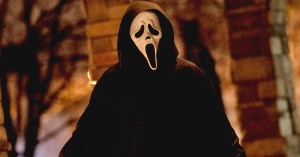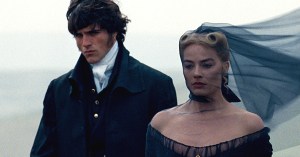A Fine Bromance and 9 More Reasons Good Omens Makes a Great Binge-Watch
David Tennant, Michael Sheen, Jon Hamm, Neil Gaiman, and more reveal the delectable appeal of new Amazon Prime fantasy series.
Neil Gaiman’s Good Omens arrives this weekend, bringing both heaven and hell with it. Based on 1990 novel Good Omens: The Nice and Accurate Prophecies of Agnes Nutter, Witch by Gaiman and Terry Pratchett, the Amazon Prime limited series tells the story of agents of God and Satan who want to stop the Apocalypse — simply because it sounds like a terrible idea. Fortunately, it seems like the reluctant Antichrist has similar inclinations.
Michael Sheen (The Queen) plays angel Aziraphale, and David Tennant (Broadchurch) is demon Crowley. The two first met when Crowley turned into a snake and slipped past Aziraphale into the Garden of Eden to tempt Eve. Theirs has been a fine bromance ever since.
Rotten Tomatoes met up with the stars, Gaiman, director Douglas MacKinnon (Doctor Who), and, representing Terry Pratchett’s estate, executive producer Rob Wilkins, ahead of the series’ London premiere to find out just what makes the Amazon Studios and BBC Studios co-production Good Omens such a delicious binge-watching option.
1. A Monty Python Nonsensibility
Starting out the gate with the credit sequence, the series pays homage to Monty Python.
But while in sketch series Monty Python’s Flying Circus, nobody expects the Spanish Inquisition, Agnus Nutter actually does expect the Spanish Inquisition when her time of judgment arrives.
2. The Celestial Bromance at Its Core

(Photo by Amazon Studios)
Aziraphale and Crowley build their lovingly adversarial relationship one historical clash after another – including, during another nod to Monty Python, when Crowley turns up as the Black Knight. Sketches of Aziraphale and Crowley’s bond strengthening over the ages are pure joy and recommend further adventures of the collegial duo. And Welsh actor Sheen and Scottish actor Tennant spark onscreen in a way that critics have hailed.
“Most of the show’s charm hinges on the unlikely camaraderie between an Angel and a Demon, played, with considerable gusto, by Michael Sheen and David Tennant,” CNN’s Brian Lowry wrote.
New York Magazine’s Keith Phipps wrote, “Good Omens can work only with the right leads, so cheers to bringing in Sheen and Tennant, two actors who know how to make a three-course meal out of understated dialogue and cosmic absurdity.”
And, from Allison Shoemaker of RogerEbert.com: “Together, it’s like watching two musicians at the top of their game play a duet; they positively sing.”
In a press conference before meeting with reporters, Tennant explained the relationship further.
“They’re not particularly good representatives of their respective head offices. They’ve rubbed off on each other, so much, that Crowley’s not that mean anymore, and Aziraphale’s not that holy,” he said. “So, between them, they’ve reached a common ground, and they’ve become each other’s, sort of, significant other, really … They’ve only got each other to rely on, and they’ve become — although they would deny it until the end of time, quite literally, they’re sort of each other’s yin and yang … But, it’s only when you see what head office is like — for instance, when the angel, Gabriel, appears — that you realize how humanized they’ve become by the mortal world, that they really like, quite a lot because it’s got wine.”
3. The Obscene Wealth of Talent

(Photo by Scott Garfitt/BACKGRID)
Sheen and Tennant are just the start. The rest of the cast fills out with an enviable assemblage of talent for serialized entertainment:
- Jon Hamm (Mad Men) as Archangel Gabriel, who leads the angelic host
- Anna Maxwell Martin (The Bletchley Circle) as Beelzebub, leader of the forces of Hell
- Josie Lawrence (Enchanted April) as 17th-century witch Agnes Nutter, who produces the only accurate book of prophecies ever written
- Adria Arjona (True Detective) as Anathema Device, a witch and Agnes Nutter’s descendant
- Miranda Richardson (Harry Potter franchise) as part-time medium and prostitute Madame Tracy
- Michael McKean (This Is Spinal Tap) as Witchfinder Sergeant Shadwell
- Frances McDormand (Three Billboards Outside Ebbing, Missouri) voices God
- Benedict Cumberbatch (The Hobbit film franchise) voices Satan
- Sam Taylor Buck as reluctant Antichrist Adam Young
The series, a coproduction of Amazon Studios and BBC Studios, is directed by Douglas Mackinnon (Doctor Who) and also features Jack Whitehall, Mireille Enos, Brian Cox, Nick Offerman, Ned Dennehy, Ariyon Bakare, Nina Sosanya, Steve Pemberton, and Mark Gatiss.
4. Expertly Drawn Characters

(Photo by Amazon Studios)
The series’ stars raved about bringing Gaiman and Pratchett’s characters to life.
“Nothing is odd about this character; I think she’s entirely relatable. Particularly, the channeling of many, many souls, alive and dead, and riding a motorbike, in a cape, with a former member of Spinal Tap. It’s just part of the day job, really,” Richardson related in a press conference before breaking off to meet with reporters. “It feels like my element. I love it. Transformation and costume and inhabiting of other, but at the same time, the character is, all the characters are, incredibly humane. I just… I love that about this project. That’s what comes across, I think.
And what will book fans think, especially given changes like Archangel Gabriel’s expanded role?
“I think had we gone into this project without Neil,” Hamm said, “there would have been a different reaction, but because Neil was involved from the get-go and was so involved during the process of making it, it became like a version 2.0. So I think the fan base was jazzed, they were like, Oh my God, we’re getting more, we’re almost getting a sequel or something, we’re getting the extended version, the EP. … We were at New York Comic Con and there were 5,000 people that showed up for a panel discussion. It was bonkers. It was like a rock concert. It didn’t hurt that we had Doctor Who on stage. It was still pretty cool and that was when I was like, Oh yeah there are way more people that are just as excited about this as I am. Worldwide, it’s been published in 70 languages.”
5. A Story With Heart

(Photo by Mike Marsland/WireImage)
Good Omens has a lot of heart. That’s baked into the series by Gaiman, the stars attest.
“The writing is absolutely promoting humanity,” Richardson said. “You know, it’s very affirmative and optimistic, really, isn’t it?”
“[Neil is] very centered,” she continued. “He knows what he thinks about everything. That doesn’t mean he’s not open. He is completely open. So you ask him a question, and it’s really considered. It’s not, ‘You don’t need to worry about that.’ It’s this is just what’s happened, or I think you should try that, or whatever it is. You know, everything is very considered. It’s great.”
Lawrence: “He has time for you, which is wonderful.”
Richardson: “Like having Daddy on set.”
Lawrence: “Yes, it is, or a beautiful angel.”
Hamm also noted that Gaiman brings something different to the process of creating a series.
“What Neil really brings to everything he does is the capacity for storytelling,” Hamm said, “and that’s first and foremost. Also I think some people in the more traditional Hollywood aspect, they’re trying to make money. They’re making product, whether it’s a Marvel movie or what have you franchise, they’re not necessarily concerned with storytelling. They’re concerned with IP, or what’s it going to be on the second weekend or what’s the third movie going to be at franchise – Neil just wants to tell a story. That’s how he’s created this career that’s been so wide-ranging, and I think you’re going to see a lot more Neil Gaiman stuff get filmed because the stories are so compelling.”
6. The Antichrist Has Never Been More Enchanting
Antichrist Adam Young has the wide-eyed English-schoolboy charm of classic heroes like Mark Lester’s 1968 Oliver or any number of Nicholas Nicklebys throughout the cinematic age – until, of course, the boy inherits his powers. Aziraphale and Crowley’s attempts to manage the situation are akin to trying to stop a tornado with a butterfly net — a magical butterfly net, but still.
7. Evolved Female Characters

(Photo by Scott Garfitt/BACKGRID)
Though Good Omens’ main characters, Aziraphale and Crowley, are male, we find engaging and richly drawn women among the secondary stars of the series. Anathema spends most of her time chasing a McGuffin, but in the end contributes greatly to the stop-the-Apocalypse cause.
“There’s a big difference between a tough female character and a strong female character and Anathema’s strong, she’s very in her essence,” Arjona said. “She’s a woman and she’s sure of herself and so unsure of what she’s doing and messes up, and she’s flawed and she doesn’t get it right all the time — sometimes she does — and she has this guy that’s following her and never falls into romance. She’s like, ‘I gotta do what I gotta do — maybe after babe. I’ll catch you later.’ She’s doing her own thing and I love that about her, and I wish a lot of other characters would be like that because relatable to me, and I see my friends and the way they deal with their careers and their own life, and it’s very similar to Anathema.”
Richardson’s Madame Tracy is a very rich character, who, despite her own flaws, endures a level of verbal abuse and emotional sabotage from Shadwell.
“Madame Tracy has her own strengths. She, in some ways, feels a bit retro. I mean, her part is retro, and the fact that she’s making a living in the way she is, is a bit retro. But at the same time she’s providing an incredible help in the community, and she’s also very supportive, and she’s trying to be a little bit life-enhancing … so there are those feminine traits, things showing. She takes care of Shadwell, and she looks out for people. It’s rather lovely, but she’s her own woman.”
Good Omens sets out to prove a love bond between the prostitute and the Witchfinder, but where she definitely shuts the door on the risk of her infidelity, his name-calling promises to continue.
“I know it is a bit questionable,” Richardson said, “but maybe it’s, pardon the pun, better the devil you know. I don’t know, you know? She’s practical.”
8. Unique Artistry

(Photo by Amazon)
The production design, effects, and costuming on the series lend a distinctive voice to the characters’ surroundings. Several of the actors noted that the costumes and unique environments helped them fully inhabit their characters.
“There’s an opportunity to sort of portray this guy as the boss that everyone has, that everyone hates, who’s constantly smiling and telling you, ‘Great job,’ while also subconsciously saying, ‘You’re terrible,’” Hamm related. “And, I’ve worked for that guy before, and I’ve hated him, and it was kind of fun to play. Just like, ‘Everything you’re doing is wrong. Keep going.’ And, I got to wear so much cashmere in this, that it was A: warm, B: soft, C: comfy. But yeah, there was a lot to recommend for being on the heavenly side of thing, from a fabric point of view.”
Arjona similarly credited the series’ style choices for aiding her performance: “I just tried on her boots and something happened, and I got really lucky because I didn’t have to do much work after I tried on her boots.”
9. An Uncompromised Creative Vision

(Photo by Ian Gavan/Getty Images)
With Good Omens, Gaiman sought to fulfill a deathbed wish of his collaborator on the book, Terry Pratchett, and so, dug in his heels.
“Being the writer was relatively pleasant and entirely stress-free in that nobody was really waiting for this. I wrote it, I promised Terry I would write it, I wrote it, did the adaptation, divided the book into six, every 50 pages: OK, that’s episode one, that’s episode two. Fair enough, I’ll write a mini movie through time that will kick off episode three. That was all simple and very stress free,” Gaiman said.
“The problem is that I’d promised Terry Pratchett that I would make a TV show that he would want to watch, and I’d learned through my previous outings in television — some of which have been incredibly successful and some of which hadn’t — that the measure of which were successful and which weren’t were not the quality of the script to begin with; it was what actually wound up on the screen at the end. And I thought, OK, I have to be in a place where I can control that, where I have a director who I can work with who we share a vision with, where I can cast the people who I see in my head, where I’m there just making sure that a producer who — producers don’t understand scripts. I wish they did, but they don’t —”
MacKinnon: “Some of them do.”
“Some of them do,” Gaiman conceded. “A lot of the time, what a producer will do when they go, ‘OK, we have X amount of money. We have this in the script and here is a sequence that is both expensive and if we lose it, we’ll save a day of filming and nobody’s going to notice if that scene is gone,’ completely failing to understand that if they pull that scene out, nothing that follows it will actually make any more sense. This is something producers have been doing since the dawn of time.
“To make this thing for Terry, what I had to do was be in a place where I could just say no when somebody said, ‘So, we think we’re going to lose Shakespeare’s Globe.’ I go, ‘Yeah, no we’re not.’ Sometimes I would come back with, ‘I’ll tell you what. If we need to save that money, we can lose this scene after that you really like but that actually doesn’t change anything. It can go.’”
It’s the only instance of anyone tied to Good Omens who we’ve spoken to describing Gaiman’s behavior on the production as anything other than “lovely.”
10. Heavenly Irreverence

(Photo by Amazon Studios)
Both Sheen and Tennant aren’t strangers to supernatural beings; Sheen appeared as Head Lycan in Charge Lucian in the Underworld vampires-versus-werewolves film franchise, then as The Twilight Saga vampire Aro. Tennant, meanwhile, not only played the titular extraterrestrial in Doctor Who for three seasons and in specials as the tenth Doctor, whose abilities were anything but earthly, but also turned up as witch and Voldemort loyalist Barty Crouch, Jr. in Harry Potter and the Goblet of Fire.
The actors appear to take on these heavenly creatures with ease and a sort of glee.
“All those characters like vampires, werewolves, angels, demons, they get reinvented — don’t they? — by each generation, because they come to represent different things for each generation,” Sheen said. “And also budgets have changed. There’s a lot more money to make stuff that can really use those sort of effects quite well. But in terms of Heaven and Hell and angels and demons — the end of time’s and apocalypse is a whole other thing, I suppose — we’re starting to think about slightly differently. I think the angels and demons thing and Heaven and Hell is always partly about going, well you have these two extremes and real life is about somehow being in the middle somewhere and being in the gray area and that’s certainly what, I think, Good Omens is about.”
There’s a good chance that Good Omens will ruffle some feathers, but Gaiman isn’t worried.
“One of the things that I made a call writing literally page one, which was, I thought, Well, it could be Adam and Eve in the Garden of Eden, and they’re not going to be white. So, in the first five minutes, you’re going to have to deal with the voice of God and she’s a woman and she’s Frances McDormand, and you’re going to have to deal with a non-white Adam and Eve. That’s your first five minutes. You can stop watching now. If you were upset or offended, great excuse to stop watching now. You will probably be much more offended by things later on like an 11-year-old Antichrist who is actually a good kid … But look, that was there for you: You had a five-minute warning — [Good Omens] actually starts with the word ‘warning.’”
Good Omens debuts on Friday, May 31 on Amazon Prime.







